Besides having music, movies, and audiobooks, Hoopla has so many great ebooks, specifically Young Adult Nonfiction ebooks. Another great perk of Hoopla? No waiting! See a book that you must have at that moment? Check it out immediately! Why wait? Visit www.hoopladigital.com or download the Hoopla app to start borrowing today. Don’t know what to borrow? We have pulled some of our favorite nonfiction teen titles for you!
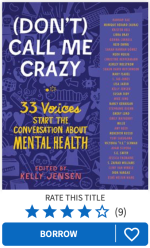 (Don’t) Call Me Crazy by Kelly Jensen (Ebook)
(Don’t) Call Me Crazy by Kelly Jensen (Ebook)
Who’s Crazy? What does it mean to be crazy? Is using the word crazy offensive? What happens when such a label gets attached to your everyday experiences? In order to understand mental health, we need to talk openly about it. Because there’s no single definition of crazy, there’s no single experience that embodies it, and the word itself means different things-Wild? Extreme? Disturbed? Passionate?-to different people. (Don’t) Call Me Crazy is a conversation starter and guide to better understanding how our mental health affects us every day. Thirty-three writers, athletes, and artists offer essays, lists, comics and illustrations that explore their personal experiences with mental illness, how we do and do not talk about mental health, help for better understanding how every person’s brain is wired differently, and what, exactly, might make someone crazy. If you’ve ever struggled with your mental health, or know someone who has, come on in, turn the pages, and let’s get talking.
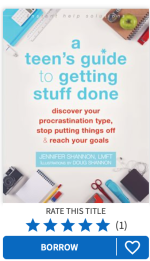 A Teen’s Guide to Getting Stuff Done by Jennifer Shannon (Ebook)
A Teen’s Guide to Getting Stuff Done by Jennifer Shannon (Ebook)
Do you procrastinate? And if so, what’s your procrastination type? In this fun and illustrated guide, author Jennifer Shannon blends acceptance and commitment therapy (ACT) and cognitive behavioral strategies to help you recognize your procrastination habits, discover the strengths of your unique procrastination type, and find the motivation you need to meet important deadlines and reach your highest goals. In the midst of modern-day distractions like smartphones, social media, and endless hours of movie and television streaming, it’s no wonder you procrastinate! But despite what you may have heard, procrastination doesn’t make you a bad or lazy person. In fact, procrastination may even work for you sometimes-creating a sense of urgency that can help you focus. But if procrastination doesn’t work for you, it can get in the way of meeting your full potential-in high school, college, your career, and life. So, how can you get things done and be your very best? In A Teen’s Guide to Getting Stuff Done, you’ll discover your procrastination type-warrior, pleaser, perfectionist, or rebel-as well as the unique strengths inherent in each type.
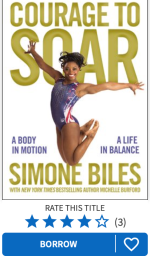 Courage to Soar by Simone Biles (Ebook)
Courage to Soar by Simone Biles (Ebook)
Simone Biles’ entrance into the world of gymnastics may have started on a daycare field trip in her hometown of Spring, Texas, but her God-given talent, along with drive to succeed no matter the obstacle, are what brought her to the national spotlight during the Olympic games in Rio de Janeiro and have catapulted her ever since-including becoming the first gymnast in competition to land a double-twisting somersault on beam and the first woman to land a triple double on floor.But there is more to Simone than the medals-fourteen of them gold-record six US all-around championships, and Olympic successes. Through years of hard work and determination, she has relied on her faith and family to stay focused and positive, while having fun competing at the highest level and doing what she loves. Here, in her own words, Simone takes you through the events, challenges, and trials that carried her from an early childhood in foster care to a coveted spot on the Olympic team.Along the way, Simone shares the details of her inspiring personal story-one filled with the kinds of daily acts of courage that led her, and can lead you, to even the most unlikely of dreams.
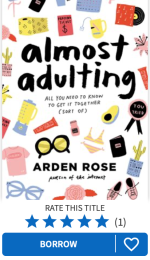 Almost Adulting by Arden Rose (Ebook)
Almost Adulting by Arden Rose (Ebook)
In Almost Adulting-perfect for budding adults, failing adults, and eaters of microwave mug brownies-Arden tells you how to survive your future adulthood. Topics include: Making internet friends who are cool and not murderers. Flirting with someone in a way to make them think you are cool and not a murderer. Being in an actual relationship where you talk about your feelings in a healthy manner? To the other person? Eating enough protein. Assembling a somewhat acceptable adult wardrobe when you have zero dollars. Going on adventures without starting to smell. How sex is supposed to feel, but, like, actually though. By the end of the book-a mash-up of essays, lists, and artwork-you’ll have learned not only how to dress yourself, how to travel alone, how to talk to strangers online, and how to date strangers (in PERSON!), but also how to pass as a real, functioning, appropriately socialized adult.
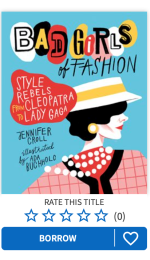 Bad Girls of Fashion by Jennifer Croll (Ebook)
Bad Girls of Fashion by Jennifer Croll (Ebook)
Clothes make the woman – and can change the world. The title says it all: Bad Girls of Fashion explores the lives of ten famous women who have used clothing to make a statement, change perceptions, break rules, attract power, or express their individuality. Included are Cleopatra, Marie Antoinette, Coco Chanel, Marlene Dietrich, Madonna, and Lady Gaga. Sidebar subjects include: Elizabeth I, Marilyn Monroe, Rihanna, and Vivienne Westwood. Photos illuminate the text, while edgy, vividly colored illustrations depict the subjects with interpretive flair. Readers will learn not only about changing fashion styles through history, but about changing historical attitudes toward women, and the links between fashion and art, film, music, politics, and feminism. With an energetic, appealing writing style, Croll demonstrates how through the ages, women – often without other means of power – have used fashion as a tool, and how their influence continues to shape how women present themselves today.
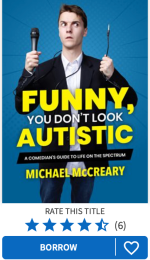 Funny, You Don’t Look Autistic by Michael McCreary (Ebook)
Funny, You Don’t Look Autistic by Michael McCreary (Ebook)
Like many others on the autism spectrum, 20-something stand-up comic Michael McCreary has been told by more than a few well-meaning folks that he doesn’t ‘look’ autistic. But, as he’s quick to point out in this memoir, autism ‘looks’ different for just about everyone with Autism Spectrum Disorder (ASD). Diagnosed with ASD at age five, McCreary got hit with the performance bug not much later. During a difficult time in junior high, he started journaling, eventually turning his pain into something empowering-and funny. He scored his first stand-up gig at age 14, and hasn’t looked back. This unique and hilarious #OwnVoices memoir breaks down what it’s like to live with autism for readers on and off the spectrum. Candid scenes from McCreary’s life are broken up with funny visuals and factual asides. Funny, You Don’t Look Autistic is an invaluable and compelling read for young readers with ASD looking for voices to relate to, as well as for readers hoping to broaden their understanding of ASD.
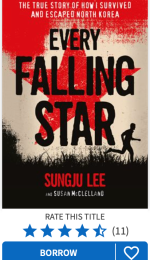 Every Falling Star by Sungju Lee (Ebook)
Every Falling Star by Sungju Lee (Ebook)
Every Falling Star, the first book to portray contemporary North Korea to a young audience, is the intense memoir of a North Korean boy named Sungju who is forced at age twelve to live on the streets and fend for himself. To survive, Sungju creates a gang and lives by thieving, fighting, begging, and stealing rides on cargo trains. Sungju richly re-creates his scabrous story, depicting what it was like for a boy alone to create a new family with his gang, his ‘brothers’; to be hungry and to fear arrest, imprisonment, and even execution. This riveting memoir allows young readers to learn about other cultures where freedoms they take for granted do not exist.
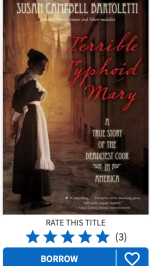 Terrible Typhoid Mary by Susan Campbell Bartoletti (Ebook)
Terrible Typhoid Mary by Susan Campbell Bartoletti (Ebook)
What happens when a person’s reputation has been forever damaged? With archival photographs and text among other primary sources, this riveting biography of Mary Mallon by the Sibert medalist and Newbery Honor winner Susan Bartoletti looks beyond the tabloid scandal of Mary’s controversial life. How she was treated by medical and legal officials reveals a lesser-known story of human and constitutional rights, entangled with the science of pathology and enduring questions about who Mary Mallon really was. How did her name become synonymous with deadly disease? And who is really responsible for the lasting legacy of Typhoid Mary? This thorough exploration includes an author’s note, timeline, annotated source notes, and bibliography.
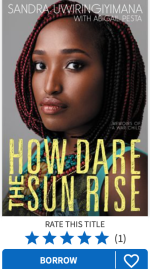 How Dare the Sun Rise by Sandra Uwiringiyimana (Ebook)
How Dare the Sun Rise by Sandra Uwiringiyimana (Ebook)
This profoundly moving memoir is the remarkable and inspiring true story of Sandra Uwiringiyimana, a girl from the Democratic Republic of the Congo who tells the tale of how she survived a massacre, immigrated to America, and overcame her trauma through art and activism. Sandra was just ten years old when she found herself with a gun pointed at her head. She had watched as rebels gunned down her mother and six-year-old sister in a refugee camp. Remarkably, the rebel didn’t pull the trigger, and Sandra escaped. Thus began a new life for her and her surviving family members. With no home and no money, they struggled to stay alive. Eventually, through a United Nations refugee program, they moved to America, only to face yet another ethnic disconnect. Sandra may have crossed an ocean, but there was now a much wider divide she had to overcome. And it started with middle school in New York. In this memoir, Sandra tells the story of her survival, of finding her place in a new country, of her hope for the future, and how she found a way to give voice to her people.
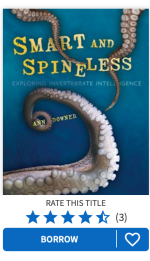 Smart and Spineless by Ann Downer (Ebook)
Smart and Spineless by Ann Downer (Ebook)
When you think of smart animals, what comes to mind? Wise old owls? Problem-solving dolphins? Maybe you have heard of Koko the gorilla, who has mastered one thousand signs in American Sign Language, or Chaser the border collie, who recognizes one thousand names for her stuffed toys. But what about ants building megacolonies or bees reporting to the hive about new nesting sites? What about escape artist octopuses and jellyfish that use their eyes (they have twenty-four!) to navigate? Are insects, spiders, and other animals without backbones considered smart, too? When we think of intelligent creatures, we often think of vertebrates, or animals with spinal columns and relatively large brains. We don’t usually think of invertebrates, or animals without a spine. But invertebrates can be astonishingly intelligent. These animals exhibit surprising feats of learning, memory, and problem-solving using their relatively simple, tiny brains-some the size of a sesame seed or even smaller. In fact, some intelligent invertebrates have no brain at all! Scientists around the world are putting invertebrate intelligence to use in mind-boggling ways. Engineers are designing swarmbots based on bees to take part in search-and-rescue efforts. And materials scientists are basing a new, tough ceramic on the structure of a mantis shrimp’s claw. In Smart and Spineless, readers will be challenged to think in a whole new way about what it means to be smart!
